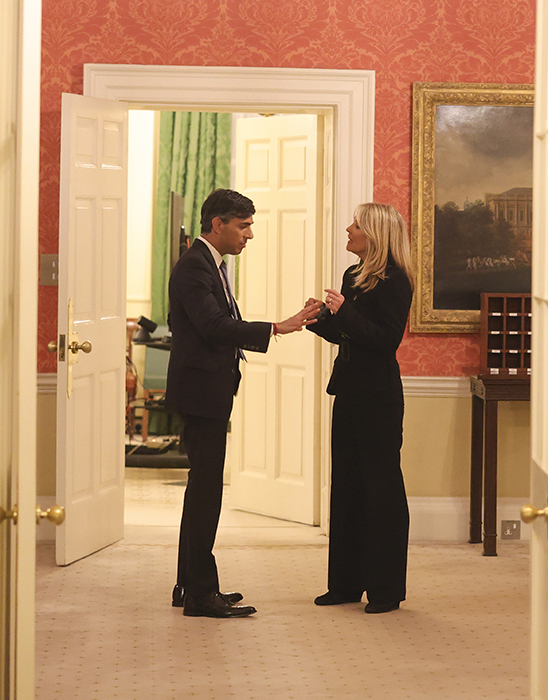The Prime Minister’s cabinet reshuffle enabled the removal of loose cannon Suella Braverman, leaving him with a ‘straight-talking’ shortfall. So back comes Esther McVey to inject some ‘common sense’. Martyn Lester is sceptical.
First published in Winter 2023/24 issue of Searchlight magazine

With this issue’s deadlines looming – indeed, technically passed – there has still been almost no clarification of the role in government that is going to be played by the conspiracist-adjacent Esther McVey, who was recalled from the backbenches (and from a lucrative gig as a presenter at GB News) in Prime Minister Rishi Sunak’s November reshuffle, but then largely kept from public view for the next few weeks.
Off the record, but clearly deliberate media briefings following the reshuffle, pushed the line that McVey had been pulled in as the “minister for common sense”. Even more off the record, she’s been referred to as the government’s “anti-woke tsar”. Neither of these is a job title that’s ever going to be set down on paper – officially, she’s a Minister of State without Portfolio in the Cabinet Office.
Before we continue, perhaps a recap is in order. Whatever thin rationale may have been put about, the only reason Sunak needed to reshuffle his team as soon as he did was to kick Home Secretary Suella Braverman to the bench. Not because she was too right wing for his regime – he doesn’t really mind throwing a diet of red meat to the Tory sceptics – but because she was a thoroughly loose cannon prone to publicly busking policy ideas, such as taking away tents from homeless people, without bothering to run them past the Prime Minister first. Her ambition to replace Sunak was simply too blatant.
For his sins of being a bit too visibly addicted to jet-set jaunts around the world, and achieving next to nothing, James Cleverly was shunted into the far less enjoyable Home Office, which must often feel like being appointed UK Ambassador to Mordor. More surprising was the appointment of former PM David Cameron to replace Cleverly at the Foreign Office, although it makes a kind of sense that we needn’t go into.
In terms of ensuring that the “great offices of state” were all occupied, this filled the hole created by Braverman’s departure. The hole it didn’t fill was having a favourite of the hard right at the top table. “Cameron for Braverman” very much had the optics of a drift to the left (we are, of course, talking relatively), and a couple of other shuffles that Sunak didn’t really need to make will have reinforced this perception among the more paranoia-inclined Tory MPs – Laura Trott replacing John Glen as Chief Secretary to the Treasury and Victoria Atkins arriving in a double-shuffle that enabled Steve Barclay to replace the much-criticised Truss sidekick (or was it mentor?) Thérèse Coffey at environment.
So, although all of Sunak’s departmental holes were filled, the upshot of Braverman’s ousting was that the regime had suffered a perceived drop in right-wing credibility, and many have speculated that McVey’s appointment to what wasn’t strictly speaking a vacancy (non-portfolio ministers are an intermittent phenomenon) was calculated as a sop to the Tory right.
Baggage
To be fair to McVey, she displays some suitability for a “minister for common sense” role, insofar as she is mostly capable of remaining calm, speaking in measured tones and not blurting out obviously batshit-crazy thoughts in the way that Braverman does. But there is at least a suspicion that she is sometimes not too far removed from the madness, just not the one caught expressing it. A bit like the kid in the gang who is dead keen on (and perhaps even thought up) the idea of leaving a dog turd on the old grouch’s doorstep, but never the one caught brown-handed when the householder whips the door open mid‑crime.
The main piece of baggage that McVey brings to government is how invested she has been, as a backbencher, in all things Covid-sceptical. Until rejoining the front bench, she co-chaired the All-Party Parliamentary Group (APPG) on Pandemic Response and Recovery, a small group (about 20 MPs and peers) with a few oddballs in its ranks – if oddballs is the right description for people such as Iain Duncan Smith and “Britain needs more babies” enthusiast Miriam Cates and former Revolutionary Communist Party activist, Living Marxism publisher and Brexit Party MEP Claire Fox.
While McVey was still with the APPG, its membership of 21 featured a statistically highly improbable three GB News figures. (And it remains a rather improbable two out of 20.) Remaining in the group are McVey’s co-presenter and husband, Conservative MP Philip Davies, and (as APPG vice-chair) Helena Morrissey. Baroness Morrissey is one of only five board members of the company that owns GB News (All Perspectives Ltd) and was drafted in following the departure of disaffected GBN figurehead Andrew Neil.
The group’s secretariat and sugar daddy (to the tune of tens of thousands, apparently) is Collateral Global, which declares only that it is a charity funded by donations, but is believed to be largely bankrolled by the Koch network.
Her group co-chair (and he’s still in place) was Labour MP Graham Stringer, who doesn’t seem to accept for one minute that humans have caused climate change and is on record as believing that dyslexia is not a real condition but some kind of hoax. Now, this does not mean or even imply that McVey shares Stringer’s weird views, but it does tell us that she was content to be closely associated with him in the same parliamentary clique.
Similarly, it’s instructive to watch (or follow the transcript of) last year’s debate on a petition to require a national referendum before Britain could sign up to a treaty giving the World Health Organization more powers to counter pandemics. In line with her “common sense” persona, McVey was not among those who outright accused the WHO of being controlled by China or Bill Gates (she doesn’t even actually want a referendum, just parliamentary votes), but she did speak of the organisation being mostly privately funded and does not seem to be embarrassed to be on the same side as the accusers in what was a pretty low participation debate.
Not, perhaps, mortifying, but presumably at least embarrassing for her nowadays would be the part of that debate where she and (then) colleague Andrew Bridgen verbally patted one another on the back as fellow sceptics. Since then Bridgen has not only been kicked out of the Conservatives but has joined the Reclaim party, and it might be unwise to seem quite so pally with him these days.
Conspiracist territory
Where we get more heavily into conspiracist territory is with the Health Advisory and Recovery Team (HART), where one can find all sorts of complaints about the vaccines – they were not properly tested, or they do not work, or the side-effects are being vastly under-reported, or that it is actually the vaccines and not the viruses that are killing people – if Covid wasn’t killing people in the months before the vaccines were developed, goodness knows what was doing it!
Similarly, the lockdowns were too early (!) or not needed at all, or the effects of them have never been properly evaluated. Schools should never have been closed at all, and so on.
McVey is not listed as a member of HART and, as you can guess from that catalogue of widely varying moans that can be found there, not even its actual members are reading from precisely the same hymn sheet. So it wouldn’t be fair to assume that she agrees with points that she has not explicitly endorsed. There cannot be much doubt, however, that she and HART are at least partly hand in glove. That she and her APPG tend to be lauded there might be considered merely suggestive, but the fact that HART’s head of communications, Jemma Moran, has now decanted herself from that team into McVey’s office as a parliamentary employee hardly looks like a coincidence.
After weeks under wraps, McVey finally surfaced as an official government representative on Any Questions on Radio 4 in December. For the most part it was a stay calm and project ‘common sense’ performance, although in addressing the topic of the Covid inquiry McVey couldn’t restrain herself from saying that it was asking the wrong questions, that she had been against much of what the government did during the pandemic, and that Labour had shamefully been a bunch of lockdown enthusiasts.
We will learn more about McVey’s role in the months ahead – and it may be that more has become clear between me writing this and you reading it. But I have a feeling that we are going to hear more about HART and McVey’s relationship with this team well before the general election rolls around.
